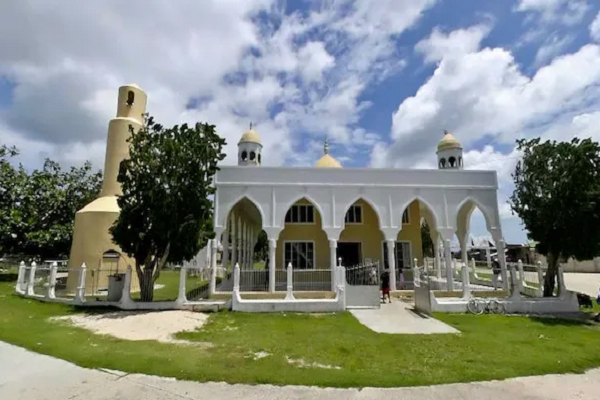Philippine: Centuries-Old Mosque Bears Witness to Rich Islamic Heritage

Standing firm against the tides of time, the resilient pillars of Sheikh Karimul Makhdum Mosque in Tawi-Tawi continue to evoke awe and reverence. These stalwart columns have weathered countless attempts at obliteration over the span of six centuries, standing tall and unyielding to this day.
Dating back to 1380, it holds the distinction of being the Philippines' inaugural mosque, according to local lore. The mosque's inception, attributed to the efforts of Arab trader and missionary Makhdum Karim, has etched its name in the annals of Southeast Asian history, marking it as one of the oldest such establishments in the region.
"The establishment of the Sheikh Makhdum Mosque in the 14th century ushered the beginning of Islamization in the Philippines," asserts Prof. Julkipli Wadi, dean of the Institute of Islamic Studies at the University of the Philippines, Arab News reported.
This event predates Spanish colonialism by 200 years, and it predates the establishment of Westernized Christianity in this corner of Southeast Asia, he added.
Nestled in the municipality of Simunul on the southernmost island province of the Philippines, the mosque's small white structure cradles pillars believed to originate from the mosque's very inception. These pillars, a testament to the mosque's historical significance, have garnered local veneration and reverence over generations.
'Sacred pillars'
"Legend has it that there were various attempts to remove the old pillars of the mosque. For some reason, those attempts were unsuccessful. Hence, some old folks thought that those pillars were a source of blessings and people began to take pieces from them and use them as amulets," Prof. Wadi shares. In response, measures have been taken to safeguard these pillars, encasing them in protective plastic glass to prevent any further erosion.
Although the mosque experienced a devastating blaze during the Japanese invasion of 1941, reducing much to ashes, the indomitable pillars remained untouched. In the 1960s, the mosque was rebuilt, and restoration efforts have been undertaken more recently.
President Benigno S. Aquino officially recognized its historical significance in 2013 by enacting a Republic Act designating Sheikh Karimul Makhdum Mosque as a national landmark.
Sheikh Makhdum, among the legendary preachers who voyaged by sea to introduce Islam to Mindanao and Sulu, held an esteemed position within the Naqshbandi, a significant Sunni order of Sufism. This branch of Islamic mysticism flourished in Central Asia before spreading to the Indian subcontinent, particularly the strategic region of Gujarat—a nexus along the Silk Road that linked China, India, and the Islamic world in the 13th and 14th centuries.
It stands as “enduring physical evidence” of Islam's historical presence in the country, said Prof. Darwin Absari from the University of the Philippines' Institute of Islamic Studies.
“It connects the country to the larger community of Muslims in Southeast Asia and the whole of the Islamic world.”
The Bangsamoro Autonomous Region in Muslim Mindanao, encompassing Tawi-Tawi, commemorates Sheikh Karimul Makhdum Day on November 7, a public holiday. In a bid to amplify its significance, Filipino Muslims have urged the Senate to extend this observance nationwide. The Bangsamoro Commission for the Preservation of Cultural Heritage asserts that the mosque has stood for more than six centuries as a beacon of legacy and pride for all Muslim Filipinos, embodying the profound impact of Islamic faith on the diverse tapestry of Philippine culture.
'A source of pride'
In a predominantly Catholic nation of 110 million, where Muslims constitute roughly 6 percent of the population, the mosque's significance extends beyond the borders of Tawi-Tawi. The admiration it commands serves as a testament to the deep roots of Islam in the region, as Prof. Nasser Kadil from the Mindanao State University said. "It has become a source of pride having the oldest mosque and implying that Sheikh Makhdum and his group first landed in Tawi-Tawi, therefore Islam (in this region) started in Tawi-Tawi.”
Source: Agencies



